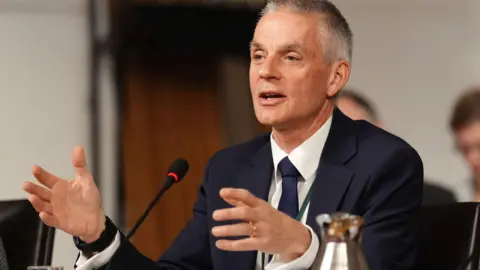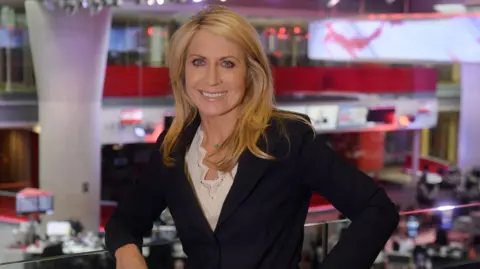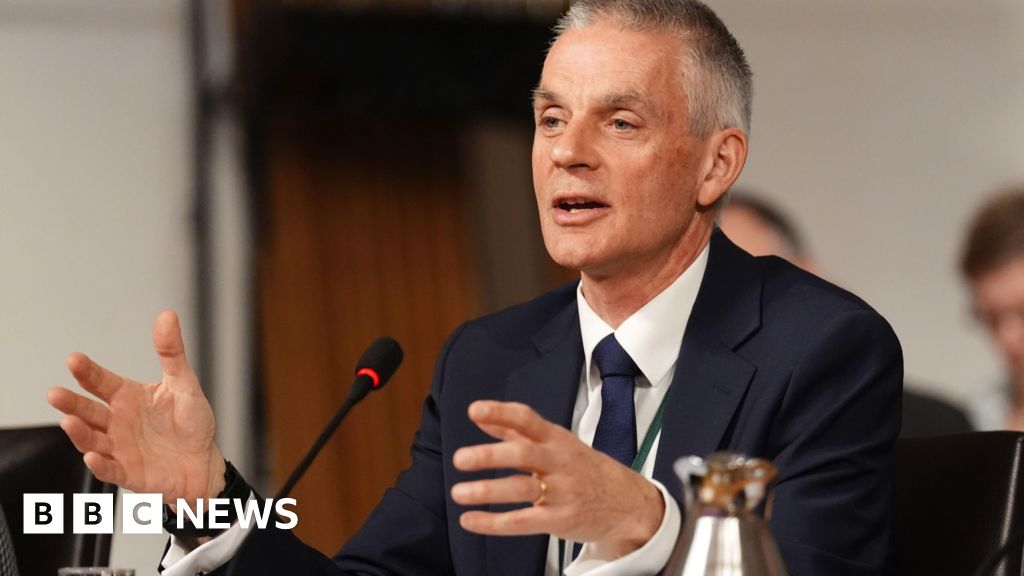Aleks Phillips
 PA Media
PA MediaTim Davie has resigned as the BBC’s director general following criticism that a Panorama documentary misled viewers by editing a speech by US President Donald Trump.
Deborah Turness, the corporation’s head of News, has also stepped down from her role over the issue.
Davie, who has been in the job for five years, had faced increasing pressure over a series of controversies.
The Telegraph published details of a leaked internal BBC memo on Monday that suggested the Panorama programme edited two parts of Trump’s speech together so he appeared to explicitly encourage the Capitol Hill riots of January 2021.
Announcing his resignation on Sunday evening, Davie said: “Like all public organisations, the BBC is not perfect, and we must always be open, transparent and accountable.
“While not being the only reason, the current debate around BBC News has understandably contributed to my decision.
“Overall the BBC is delivering well, but there have been some mistakes made and as director general I have to take ultimate responsibility.”
In Trump’s speech in Washington DC on 6 January 2021, he said: “We’re going to walk down to the Capitol, and we’re going to cheer on our brave senators and congressmen and women.”
However, in the Panorama edit he was shown saying: “We’re going to walk down to the Capitol… and I’ll be there with you. And we fight. We fight like hell.”
The two sections of the speech that were edited together were more than 50 minutes apart.
The publication of the internal memo sparked criticism of the BBC, including from the White House, which described the corporation as “100% fake news” and a “propaganda machine”.
The pair’s resignations come ahead of a statement expected on Monday by BBC chairman Samir Shah to a parliamentary committee in which he was anticipated to apologise for the way the speech was edited.
Commenting on the resignations on Sunday, Shah said it was a “sad day for the BBC” and that Davie “had the full support of me and the [BBC] board throughout” his tenure.
He continued: “However, I understand the continued pressure on him, personally and professionally, which has led him to take this decision today. The whole board respects the decision and the reasons for it.”
Turness said in a statement on Sunday night that the Panorama controversy had “reached a stage where it is causing damage to the BBC”, adding: “The buck stops with me.”
 Jeff Overs / BBC
Jeff Overs / BBCShe said: “In public life leaders need to be fully accountable, and that is why I am stepping down. While mistakes have been made, I want to be absolutely clear recent allegations that BBC News is institutionally biased are wrong.”
Turness has been CEO of News and Current Affairs for the past three years.
The internal memo published by the Telegraph also raised concerns about a lack of action to address what it described as “systemic problems” of bias in BBC Arabic’s coverage of the Israel-Gaza war.
The memo also expressed concerns about the BBC’s coverage of trans issues.
Separately on Thursday, the BBC upheld 20 impartiality complaints over the way presenter Martine Croxall altered a script she was reading live earlier this year on the BBC News Channel, which referred to “pregnant people”.
The corporation has also faced criticism in recent months over failing to disclose that the narrator of a documentary about Gaza was the son of a Hamas official.
The BBC’s broadcast of a Glastonbury set in which punk duo Bob Vylan led a chant of “death, death to the IDF [Israel Defence Forces]” also broke editorial guidelines in relation to harm and offence.
Davie, who has worked for the corporation for 20 years, stressed that “our journalism and quality content continues to be admired as a gold standard” and that the organisation was “overwhelmingly kind, tolerant and curious”.
He said the timing of his departure – which will involve an “orderly transition” to a successor in the coming months – would allow the next director general to “positively shape” the next Royal Charter.
The Royal Charter sets the funding and regulatory duties of the BBC and is negotiated with the government. A new one must be reached before the current one expires at the end of 2027.
Culture Secretary Lisa Nandy thanked Davie, saying he had “led the BBC through a period of significant change”.
She went on: “The BBC is one of our most important national institutions… Now more than ever, the need for trusted news and high quality programming is essential to our democratic and cultural life, and our place in the world.”
She added the government would ensure the Charter review “is the catalyst that helps the BBC to adapt to this new era”.
Conservative leader Kemi Badenoch said it was “right” Davie and Turness had stood down, but said there was “a catalogue of serious failures that runs far deeper” that “cannot be swept away with two resignations”.
She continued: “The culture at the BBC has not yet changed. BBC Arabic must be brought under urgent control. The BBC’s US and Middle East coverage needs a full overhaul.”
Badenoch said the BBC “should not expect the public to keep funding it through a compulsory licence fee unless it can finally demonstrate true impartiality”.
Sir Ed Davey, leader of the Liberal Democrats, said the resignations “must be an opportunity for the BBC to turn a new leaf”, adding: “The BBC isn’t perfect, but it remains one of the few institutions standing between our British values and a populist, Trump-style takeover of our politics.”
Reform UK leader Nigel Farage said the departures must mark “the start of wholesale change”, calling on the government to appoint a leader who had “a record of coming in and turning companies and their cultures around”.
The BBC board is responsible for appointing a director general under the terms of its Charter.
Prior to being appointed the BBC’s 17th director general, replacing Lord Hall in 2020, Davie was the chief of BBC Studios, and before that was a marketing executive at Pepsi and Proctor & Gamble.
Turness previously headed news organisations ITN and NBC News International.



